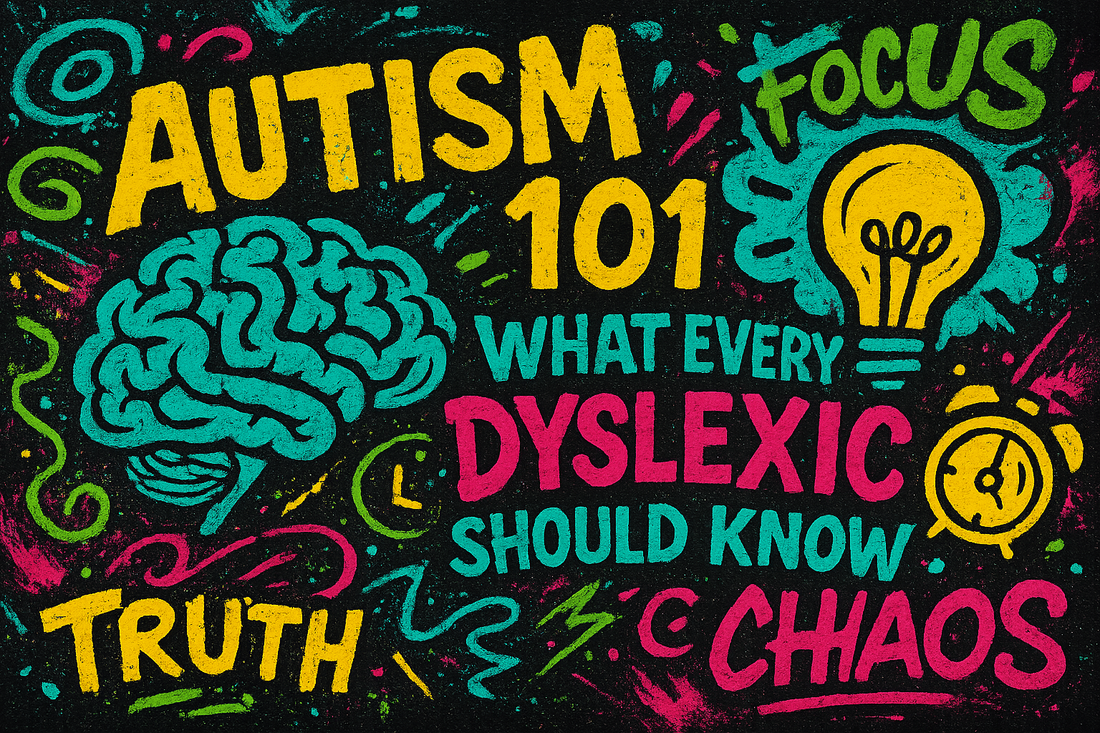
Autism 101 - What Every Dyslexic Should Know
Share
Ever wondered how autism and dyslexia can intersect in one person’s mind? In our latest podcast episode (player above), we shine a light on this overlooked link. We explore the traits that make each condition unique, then see how they combine to create a fascinating puzzle—yes, including challenges, but also surprising strengths.
In this blog post, you’ll discover how autism affects day-to-day routines and how dyslexia shapes the way we process information. We’ll talk about sensory overload, emotional intensity, and why self-compassion can be a game-changer. If you’ve experienced any combination of these traits, you’ll learn you’re far from alone.
Understanding Autism and Dyslexia
Autism isn’t just about what we see in TV dramas or memes. It’s a broad spectrum of traits that might include difficulties in social communication, strong desires for routines, and deep interests in specific topics. Many autistic individuals have a natural ability to dive into detail—often focusing so intently that the world fades away.
Dyslexia, on the other hand, often involves challenges with reading and writing. Those with dyslexia might rely on visual or intuitive thinking instead of conventional word-based processing. There are times when storing or retrieving information can feel like wading through treacle. We manage it, but it’s not always the neat, linear process most people take for granted.
Most people don’t realise these two conditions can overlap. When they do, the experience can become especially complex. Autism might bring sensory sensitivities and communication challenges, while dyslexia amplifies language processing barriers. The combination can lead to moments of unique creativity though, as we notice patterns and connections others miss.
Overlapping Traits and Surprising Strengths
Although they’re different conditions, autism and dyslexia can share some traits. Many people switch back and forth between moments of intense focus and blunt feelings of overwhelm. Some days, processing social cues or new information is a smooth process. Other days, it might take extra effort to keep up with conversation.
But beneath these challenges, some amazing strengths can emerge:
- Innovative Problem-Solving: Autistic and dyslexic brains often see solutions outside traditional boundaries.
- Strong Visual Thinking: Information can be integrated through images or spatial reasoning, leading to big-picture insights.
- Heightened Empathy (in some cases): Intense emotional responses mean you can feel others’ struggles at a deep level.
It’s important to recognise that these strengths don’t cancel out the difficulties. Still, they can be valuable resources. As you learn to work with your neurodivergent mind, rather than fighting against it, you’ll see these natural talents grow.
"Autistic and dyslexic experiences often overlap, and that overlap can be the hidden reason why some of us don’t fit neatly in a box."
Tools for Calming Sensory Sensitivities
Sensory issues are a major part of autism and can also affect those with dyslexia. Excess noise, bright lights, or even uncomfortable clothing can throw your whole day off balance. If normal life feels like you’re constantly managing a barrage of stimuli, having a supportive toolkit can be a lifesaver.
You might try these ideas:
- Noise-Cancelling Headphones: They can reduce distracting sounds when you’re focusing or taking a breather.
- Visual Schedules: Try pictures or colour-coded reminders for daily tasks if words tend to blur together.
- Weighted Blankets: Some people find that gentle pressure calms them, helping them sleep or relax more easily.
Managing your environment can help you keep a clearer head. It’s not about avoiding new experiences forever. It’s about recognising where you’re sensitive and giving your brain space to breathe.
Why Compassion and Sleep Matter
It’s easy to be hard on yourself when daily tasks feel like uphill battles. You might wonder why you can’t cope in the ways others do. That’s where self-compassion comes in. Stepping back, recognising that you have a unique brain, and speaking kindly to yourself can help reduce anxiety and depression.
Sleep is also more crucial than you might realise. When the body doesn’t rest well, it’s harder to regulate emotions, stay focused, or process information. Good sleep habits can improve mental clarity, stabilise moods, and help those deep-thinking brains recharge.
If you’re searching for ways to support better sleep, check out Added Nutrition. You’ll get a 20% discount on your first order, so it’s a good time to explore what might help you wind down. Settling an overactive mind before bed can feel like a superpower when the sun comes up.
Resources and Next Steps
Getting a formal diagnosis for autism or dyslexia typically involves behavioural assessments, questionnaires, and professional observations. No simple blood test or scan can confirm these conditions. For many people, self-discovery starts with reading about the traits or sharing experiences with others who’ve been there.
Think about joining us at rightbrainresetters.com if you want a sense of community. There’s something powerful about being in a group that just gets it. You’ll also find an online space to share your journey at facebook.com/groups/adultdyslexia.
If you’re longing to learn more, truthaboutdyslexia.com is a fantastic hub for knowledge. It’s full of insights, references, stories, and fresh ways to see dyslexia—and its friends like autism and ADHD—in a different light.
- Overlooked Link: Autism and dyslexia can blend in surprising ways.
- Social Challenges: Differences in communication and routine don’t mean impossible barriers.
- Sensory Overload: Noise, lighting, and physical textures matter more than we might think.
- Emotional Intensity: Anxiety and depression can creep in but self-compassion helps.
- Better Sleep: It boosts brain function and reduces stress.
Ready for more? Listen to the full episode at the top of this page and dive deeper into these topics. You’ll find practical tips and personal stories that’ll resonate, whether you suspect overlap between autism and dyslexia or simply want to understand friends or family members better.

